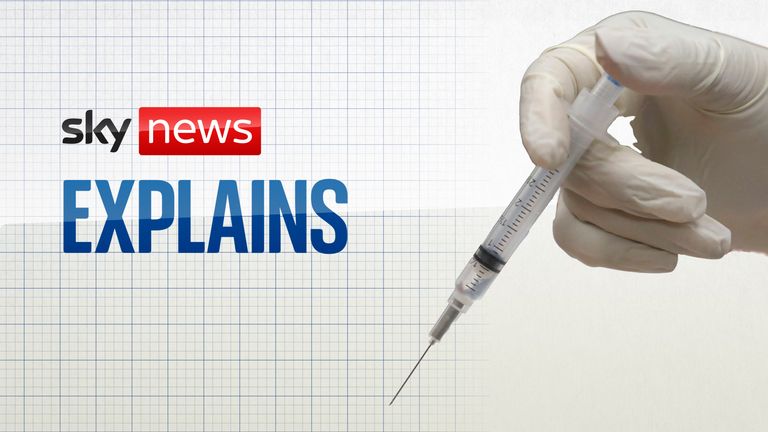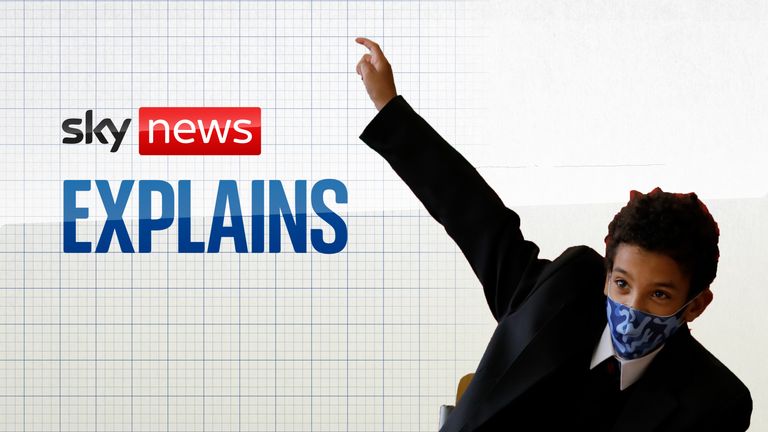COVID-19: Is the UK’s booster jab rollout too slow – and will it work?
One of the UK’s top epidemiologists has warned that COVID booster vaccines need to be rolled out faster to keep people safe this winter.
Professor Neil Ferguson, who sits on the government’s Scientific Advisory Group for Emergencies (SAGE), says it’s “critical” that the booster programme is “accelerated”.
His comments to the BBC came after one of the UK’s former chief scientific advisers told Sky News the rollout was progressing “extremely slowly”, as daily COVID cases near 50,000.
As winter looms, with all the usual pressures that brings for the NHS, Sky News looks at whether the COVID booster programme is as sluggish as it appears and if it will work as hoped.
Why do we need boosters now?
Coronavirus case levels are the highest they have been in three months – with a seven-day average of 43,079 – and near to 50,000 infections reported on 18 October alone.
Although the vast majority of adults have had two doses of a vaccine, recent Public Health England (PHE) data confirmed fears that the immunity they offer decreases over time.
According to the PHE study, the AstraZeneca jab is less effective than Pfizer against the Delta variant as time goes on – with protection against symptomatic infection falling to 47% after 20 weeks.
In the initial rollout, many were given the AstraZeneca jab, so the government is offering the most vulnerable groups a third dose of Pfizer or Moderna to “extend protection into next year… and reduce the risk of needing admission to hospital this winter”.
Has the booster rollout slowed down?
Former chief scientific adviser Sir David King claims the booster programme is going “extremely slowly”.
“I do know many older people who haven’t had their booster,” he told Sky News.
Around 30 million people in the UK – from nine vulnerable groups – will be offered a third vaccine dose six months after their second.
Currently, there are around 8.5 million people eligible in England, but only 3.7 million have had their booster.
“At the moment, uptake is not as high as we would have liked,” Dr Raghib Ali, senior clinical research associate at the University of Cambridge’s epidemiology unit, told Sky News.
“It was so high the first time round, it was always inevitable it would be somewhat lower this time.”
How and when can you get your COVID booster jab?
Why is it taking longer than the initial rollout?
Dr Anil Mehta, primary lead for Barking, Havering, and Redbridge in northeast London, says there are several reasons.
“We have an exhausted workforce – primary care workers are on their knees and that has slowed us down,” he said.
“We’ve been at this for 20 months now. I’ve been a GP for 26 years, and I’ve never seen such exhaustion in my colleagues.”
He also claims there “hasn’t been enough national publicity” to promote booster vaccines, in the same way there was at the start of the rollout.
And thirdly, booster jabs are being administered at the same time as flu ones – and other COVID doses.
“We’re doing a lot of things at the same time – first doses, second doses, boosters and schools,” Dr Mehta adds.
“We’re also in the middle of a flu campaign. People are being told they can have their booster and flu jabs at the same time, but a lot of people don’t want that.
“We’ve got too much vaccination together – and all of these things will have an impact on the booster campaign.”
Why aren’t we giving them to younger people?
Currently, only people over 50 and those in the other eight clinically vulnerable groups can get a booster vaccine.
Professor Wei Shen Lim, chairman of the government’s Joint Committee on Vaccination and Immunisation (JCVI), said this is because “younger people tend to generate good immune responses from primary vaccinations”.
While some are calling for all 18 to 50-year-olds to get boosters, most have not been vaccinated long enough to need a third dose yet.
“The vast majority of the younger age groups aren’t even eligible yet,” Dr Ali says. “And they haven’t reached the point where their immunity is starting to wane.”
Dr Mehta claims it will be “well into the spring” until the first nine groups have had their third doses.
In September, Professor Lim said “younger healthier people may not need an earlier booster dose” and more evidence is needed for a decision on the 18 to 50s.
Dr Ali says it is “too early to say” what that decision will be, but if hospital admissions rise significantly, he thinks the rollout will be extended.
“In Israel we’ve seen hospitalisations falling after boosters were given to all adults,” he said.
Should 12 to 15-year-olds be getting more than one jab?
Professor Ferguson also warned that “infection rates are highest in teenagers at the moment”.
Currently, the government is only offering one dose of a vaccine to 12 to 15-year-olds, but Prof Ferguson says “two doses are needed to block infection and prevent transmission” among secondary school pupils.
Since schools reopened in September, cases have risen the most in 10 to 14-year-olds – with a seven-day average of 1,704 per 100,000 for that age group by mid-October.
But with the rollout to teenagers only starting in late September – and two weeks needed for doses to take full effect – it is not yet clear whether a single dose is enough to curb new infections.
Will boosters prevent a winter lockdown?
Although uptake for boosters has slowed, some experts say the recent sharp rise in cases will encourage people to get third doses in the coming weeks.
“It’s a natural human response that we take action when perceived risk is higher,” Dr Ali said.
“So I expect people’s behaviour to change as cases go above 50,000 a day – with regards to vaccine uptake, face masks and social mixing.”
Mask rules in the UK
These changes in behaviour would help reduce transmission and stop the government implementing its Plan B for more restrictions if the NHS gets overwhelmed.
“I remain hopeful,” Dr Mehta adds. “We had very high levels of first and second dose uptake – so the likeliness of the NHS being burdened is far reduced.
“If we continue the campaign, I’m hopeful we won’t need to go into lockdown again, but it is an uncertain winter we’re facing.”
Source: Read Full Article






